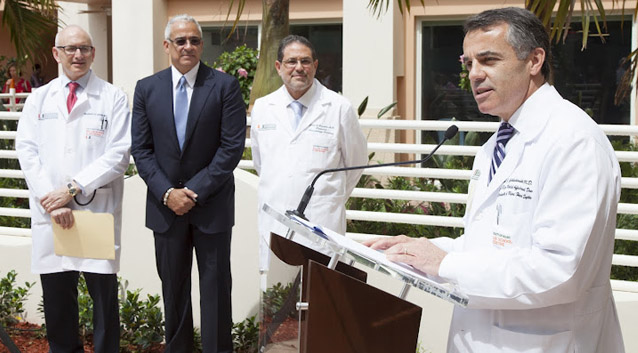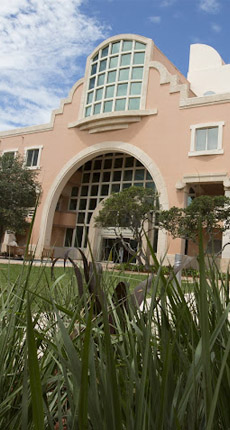News Release
Helping Kids with Cancer
MIAMI, May 23, 2012 —Creating a new paradigm for treating children with cancer, alex’s place is now open at Sylvester Comprehensive Cancer Center. The first facility of its kind in the nation and the first pediatric oncology clinic at Sylvester, alex’s place merges research and clinical care from an academic medical center with innovative technology designed to ease the anxiety of therapeutic visits.
The novel approach is the brainchild of philanthropist and businessman Alexander “Alex” Daly and Julio Barredo, M.D., Toppel Family Professor of pediatric hematology-oncology and director of children’s cancer programs at Sylvester, which is part of UHealth-University of Miami Health System.
“We have created not only a state-of-the-art clinical space with alex’s place, but initiated a new approach to treating these young patients,” says Barredo, noting that treating children involves caring for the patient, and their entire family. “Because of the unique structure of alex’s place, we have taken that extra step beyond our already exceptional research and clinical care, incorporating technology to create a better experience and what we hope is a better outcome for our patients.”

From left, Stephen D. Nimer, M.D., Alexander Daly, and Julio Barredo, M.D., look on as Dean Pascal J. Goldschmidt, M.D., welcomes guests to the ribbon-cutting ceremony for alex's place.
alex’s place is designed to handle patient visits more efficiently, providing areas for infusions and transfusions that are both private and age-appropriate. In most cases, children and their families often spend hours in the clinic, a hardship doctors and other caregivers work to reduce to minimize the patient’s exposure to infections. Animated panels in exam rooms distract young children from the medical procedures, easing their anxiety. A classroom provides space where patients and their siblings can keep up with homework, and an outside space includes a garden where parents can find a quiet retreat.
The clinic is multidisciplinary, so that children can see not only their oncologist, but other specialists who are participating in their care. Barredo, associate chair for basic research in the Department of Pediatrics, explains that cancer care for children can be complex and often requires input from endocrinologists, radiologists, neurologists and others who are now co-located in the new facility, a single-location approach that makes clinical visits much easier on families.
“The ability of our experienced pediatric oncology staff to provide outstanding medical care in a comforting and friendly environment makes alex’s place such a special place for children and their parents,” said Stephen D. Nimer, M.D., director of Sylvester. “Children need not only multidisciplinary care but also an environment where they can continue being children, which includes creative playtime and their ability to get their homework done. We are all proud to be a part of alex’s place.”
Alex, a UM alumnus, was particularly drawn to pediatric oncology because “of the ability to impact someone whose life is just beginning. The doctors and nurses are working to keep these children alive and functioning at a high level for a longer time. The science is there. This is now science with a heart.”
Environmental and technological innovations are among the new components of the already stellar academic research and clinical care provided by Sylvester’s pediatric oncologists. alex’s place has distinct age-appropriate environments and technologically-advanced children’s activities. As they arrive for treatment, children are greeted by an animated avatar that mirrors and reacts to their movements; the lily pads in an interactive “fish pond” for toddlers does the same, providing much-needed distractions. Using an interactive floor-to-ceiling mosaic screen, pre-teens and teens can create custom videos and share them via email, facilitating the critical social contact teenagers need to maintain a sense of normalcy with friends at school.
The interactive screens were designed by Snibbe Interactive, a company that creates interactive displays for a variety of outlets, including James Cameron’s Avatar Exhibition and the Beijing Olympics. Artist, entrepreneur and CEO Scott Snibbe says alex’s place is “blazing the trail” of using interactivity in children’s hospitals. “Through immersive interactive technologies, we can not only help them forget their troubles, but also help build social connections with other kids and even get exercise.”
Steven E. Lipshultz, M.D., the George Batchelor Professor of Pediatric Cardiology, describes the new pediatric oncology unit as a “shining jewel in the UHealth approach to childhood illness. We continue to strive to create gentler, yet more effective therapies for a variety of diseases, realizing that children cannot be treated as little adults. alex’s place will complement the inpatient home for our childhood cancer programs at the Holtz Children’s Hospital.”
Physicians are realizing the importance of reducing stress in patients across all age groups. That’s no more apparent than in children coping with a cancer diagnosis, which can be especially frightening. With the interactive elements incorporated into the treatment regimen, Barredo plans to study their effects on reducing stress.
Sylvester has the only Pediatric Phase I clinical trials program in South Florida, and the goal is to foster more collaboration between Sylvester scientists and pediatric oncologists. With alex’s place bringing together researchers and physicians, the cancer center will be able to develop more pediatric cancer therapies and trials. Barredo said there’s “no reason for children or their families to leave South Florida for treatment.”
